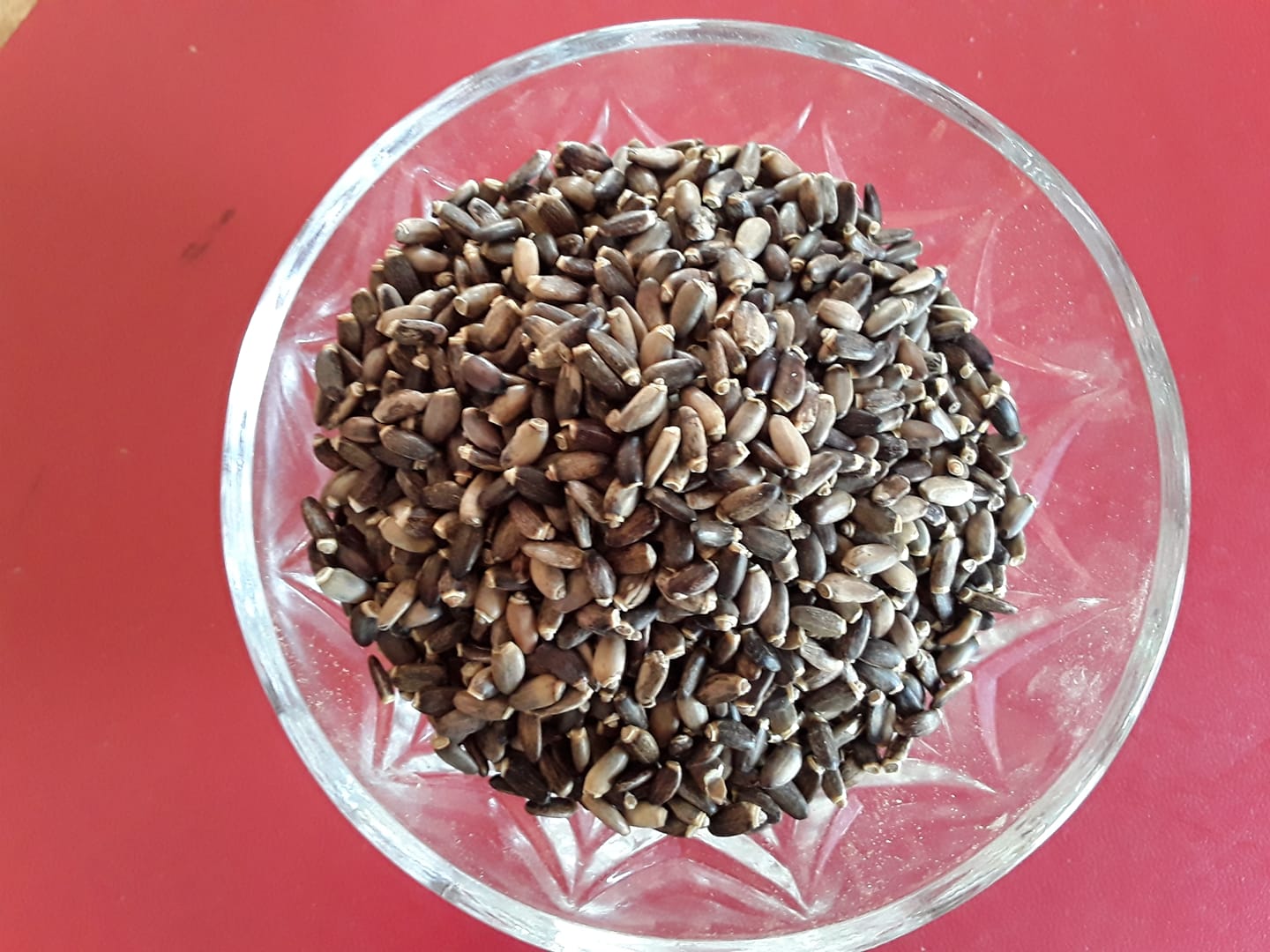
Milk Thistle Seeds. Silybum marianum syn. Carduus lactifolius, Carduus marianus, Centaurea dalmatica, Mariana lacteal. Plant Family: AsteraceaeOther Names: Marian Thistle, Mary Thistle, Our Lady’s Thistle, Lady’s Thistle, Dappled Thistle, Thistle Finch.
Native to the Mediterranean this biennial herb can also be found growing throughout Europe and has settled itself into Californian and Australian landscapes. The seeds also called achene’s, are produced when the flowers fade, the unprocessed ripe seed have fine white silky hairs attached, which help the seed to float on the breeze to disperse to new areas like the seed of the dandelion. The processed seeds are light brown and approximately 3-5m in length. The roasted seed has been used as a substitute for coffee; the whole seeds can also be added to breads, biscuits and cereal bars. Oil is extracted from the seeds and used in the cosmetics industry for adding to skin creams and lotions. Originally, the tea was used to treat liver ailments and snake bites, but was later used to treat skin rashes, kidney disease, and spleen problems. Due to its gentle reaction on the skin, milk thistle tea mixtures or extracts are often used in modern beauty care products.
Milk thistle seeds can be used as part of a detox tea. The active ingredient in milk thistle is called silymarin. It is mainly used to treat liver problems, but some people claim it can lower cholesterol and help manage type 2 diabetes. Milk thistle is a flowering plant that comes from the same family of plants as the daisy. It grows in Mediterranean countries and is used to make natural remedies.
- Milk thistle may help to promote healthy skin. A 2015 study found that milk thistle helped improve inflammatory skin conditions when applied to the skin of mice. Milk thistle was also found to have antioxidant and anti-ageing effects on human skin cells in a laboratory environment in another study.
- Initial animal research conducted in 2016 found that silymarin caused weight loss in mice that were fed a diet intended to cause weight gain. This suggests milk thistle may be beneficial for those looking to lose weight. More research into the effects of milk thistle on weight loss in humans is needed to confirm this, however.
- Milk thistle may play an essential role in supporting bone health. A 2013 study found that milk thistle helped to prevent bone loss.
The study looked specifically at bone loss caused by a deficiency in oestrogen. It is not yet clear whether milk thistle is equally beneficial for bone loss with a different cause. Further studies are needed before it is safe to conclude that milk thistle supports bone health in humans. - A 2015 study found that milk thistle increased resistance to oxidative stress. Oxidative stress is a potential cause of Alzheimer’s disease. In this way, milk thistle may help improve cognition and treat degenerative conditions that affect the mind. Again more research on humans is needed.
- Milk thistle may help strengthen a person’s immune response and help them fight off infection. A 2016 study on an animal model found that milk thistle extract improved the immunity when consumed. An older study found that milk thistle extract had a positive effect on immune response in humans.
Milk thistle tea is quick and easy to make, and the primary way folks use this wild edible plant for its proclaimed natural medicinal properties.To make the tea: 1 tablespoon milk thistle seeds fresh loose, dried, or powdered; 1 teaspoon honey; 1 cup water; 1 teaspoon whole milk optional, but does make it creamier. Steep for about 5 minutes then strain. If drinking milk thistle tea, it is best to limit intake to 6 cups a day. When allowed to cool to at least room temperature, milk thistle tea with honey (omit the milk) can be used as a wound wash, skin rash or boil treatment.
As with any natural remedy, people should discuss using milk thistle with a doctor before taking it. Always thoroughly research any new herb you are considering taking. And if pregnant, breastfeeding or taking prescription drugs, please talk to your healthcare provider first. Milk thistle may interact with some medications. This is of particular concern if a person is already receiving treatment for liver conditions. Because milk thistle is related to ragweed, folks who suffer from related allergies should not consume this wild edible plant or items made from it. The milk thistle can mimic the way oestrogen functions in the body, and could cause complications or ill effects on women who have endometriosis, breast cancer, fibroid tumours, or uterine cancer.
